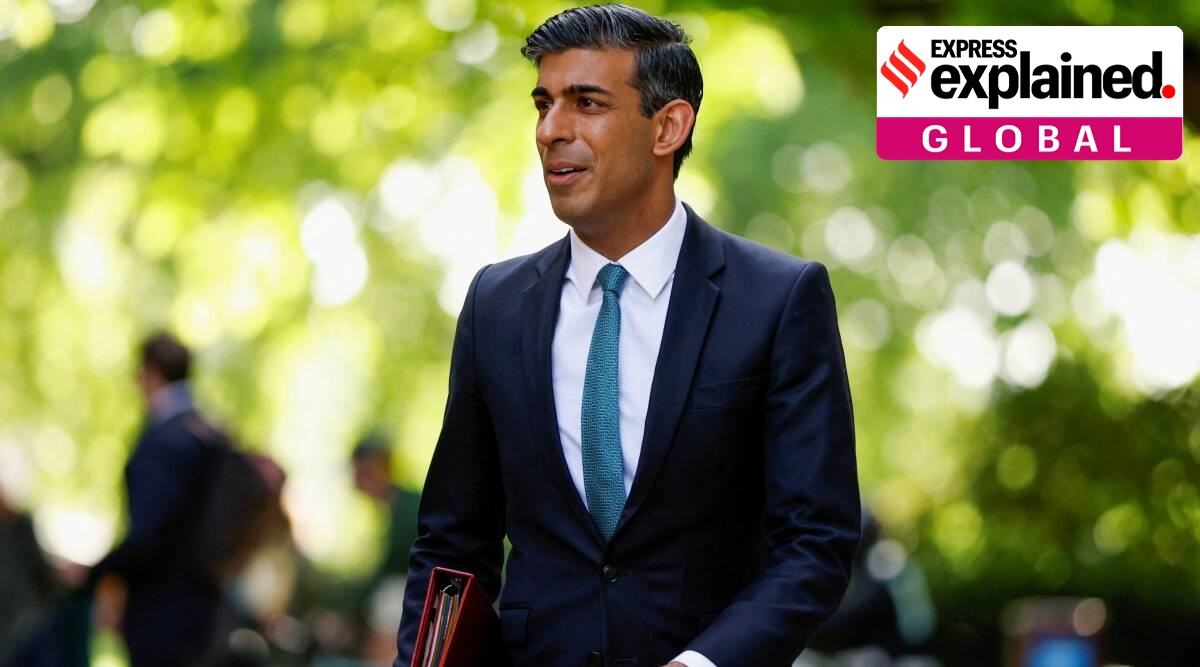Announcing his bid to once again run for Prime Minister of the United Kingdom, former finance minister and MP Rishi Sunak said on Sunday (October 23) he wants to fix the economy and unite the Conservative Party.
Sunak had earlier thrown his hat in the ring in July, raising the possibility of the first ever non-white, Indian-origin prime minister of the UK. After some weeks of campaigning, however, Conservative party members chose Liz Truss over Sunak. With Truss’s resignation, can Sunak become the next UK prime minister?
How can Rishi Sunak become PM?
Unlike in July 2022, when PM Boris Johnson resigned and Sunak joined the contest for leadership, the conservative party has drastically cut the duration of the process for selecting the new party leader and prime minister.
By Monday, candidates will have to show they have the support of at least 100 Members of Parliament. The threshold for establishing support may have been kept high to speed up the process. If only one person achieves this, they will get elected directly. If more than one person gets the required support, Conservative MPs will vote and the person with the lowest number of MPs supporting them will be eliminated.
Conservative MPs will then vote between two candidates for their preferred choice. Finally, other Conservative Party members will vote online, and the winner will become the party leader and the new UK Prime Minister by Friday.
Does Sunak have enough MPs rooting for him?
As of Sunday, a few prominent leaders had pledged their support to him. Recently ousted home minister Suella Braverman was quoted by the BBC as saying, “I want a leader of our party and our country to inspire hope for a better future and raise our spirits. And I need a leader who will put our house in order and apply a steady, careful hand on the tiller. That person, for me, is Rishi Sunak.”
Kemi Badenoch, secretary of state for international trade who also stood for the PM post in July, wrote an article stating: “I worked with Rishi in the Treasury when he was chancellor. Like any work colleagues, we had our disagreements, which I elaborated on when we were competitors in the same contest…Now it is imperative that I let people know the decisions he made that I knew were absolutely right.”
Story continues below this ad
The BBC’s tally of public declarations of support currently estimated 144 MPs for Sunak, 56 for Boris Johnson, and 23 for Penny Mordaunt, the Leader of the House of Commons or the lower house. While Boris Johnson has not formally declared his intention to run, he is widely expected to do so. The BBC also reported that Sunak and Johnson met recently, and Sunak-backer Dominic Raab said the two had “a very good conversation about the need for unity.”
But what happened with Sunak the last time around?
Back in July, Rishi Sunak emerged as the favourite among conservative party MPs. He and Liz Truss were the most favoured candidates and were given a few weeks to participate in campaigning and public debates in order to reach out to around 160,000 party members across the UK.
During that period, Sunak advocated for a policy approach based on reducing government lending and cautioned against inflation remaining high. Truss was seen as more favourable to traditional voters, while Sunak was often targeted for his personal wealth, with the perception that he was out of touch. Truss won the election with around 80,000 votes to Sunak’s 60,000.
However, dissatisfaction only mounted over Truss’s few weeks in office. The economic policies put in place after her election were not well-received, particularly a plan for cutting taxes that was immediately withdrawn. The fiscal plan led to massive market volatility, tanked the currency, and increased mortgage rates. Britain’s central bank, the Bank of England, was forced to intervene in the debt market.
Story continues below this ad
As a result, buyer’s remorse could be in Sunak’s favour. He has stressed on his record as the Chancellor of the Exchequer during the pandemic. Though his plans were not universally supported, his presence and experience are being seen as relatively reassuring compared to Johnson and Truss, both of whom have already been in and out of office.








































